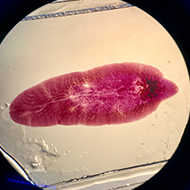Sheep vets urge vigilance over liver fluke

Sheep vets say that liver fluke is becoming a less predictable challenge, and therefore testing is critical to ensure the health of livestock.
Sheep vets are warning livestock farmers to be on their guard for liver fluke this season despite the risk of the parasite disease remaining low for much of the UK.
The Sustainable Control of Parasites in Sheep (SCOPS) and Control of Cattle Parasites Sustainably (COWS) say that liver fluke is becoming a less predictable challenge, and therefore testing is critical to ensure animals aren’t treated too early, unnecessarily, or miss a vital treatment.
Speaking on behalf of both groups, John Graham Brown from Liverpool University said: “It is really important to repeat testing until the risk period is over. A negative test does not mean you can sit back and relax.
“Plan to repeat tests in three to four weeks' time to make sure you don’t get caught out. Sheep are most likely to be seriously affected by acute liver fluke disease in the autumn and early winter, which means they are the priority for testing and also the best indicator of the presence of liver fluke on the farm.”
Vet Matt Colston from Elanco Animal Health said that the recent wet and mild weather in some parts of the UK has favoured the mud snail - a critical part of the liver fluke lifecycle. As such, there could be an increase in infection rates in the weeks to come.
“The mild weather has also meant that cattle have tended to stay out longer, potentially exposing them to more risk,” he added.
According to Michele Macrelli of APHA, Carmarthen, there has been a significant number of positive test results for farms in South Wales, highlighting the regional variation in risk this year.
Sheep Veterinary Society president Rebecca Mearns said: “So far this season we have seen positive results in tests on faeces in some areas, though many samples received have tested negative as the liver fluke stages in the cattle and sheep are not yet mature enough to be detected by these tests.
“I would also urge livestock farmers to take note of feedback on liver rejections from the abattoir and always investigate any deaths with a post-mortem examination to check for evidence of fluke in the liver.”
Several liver fluke tests are available to farmers, with the most appropriate varying according to the season., Farmers are encouraged to speak with their vet to find out which test is best for them.



 The latest
The latest